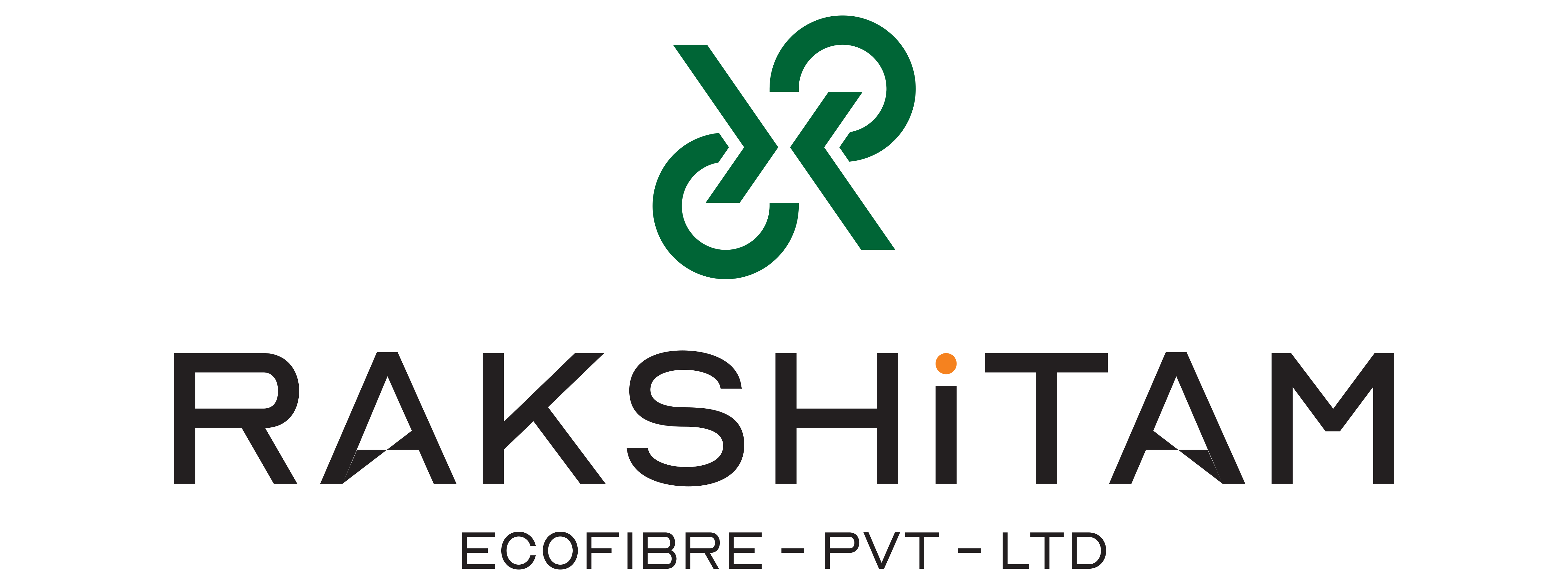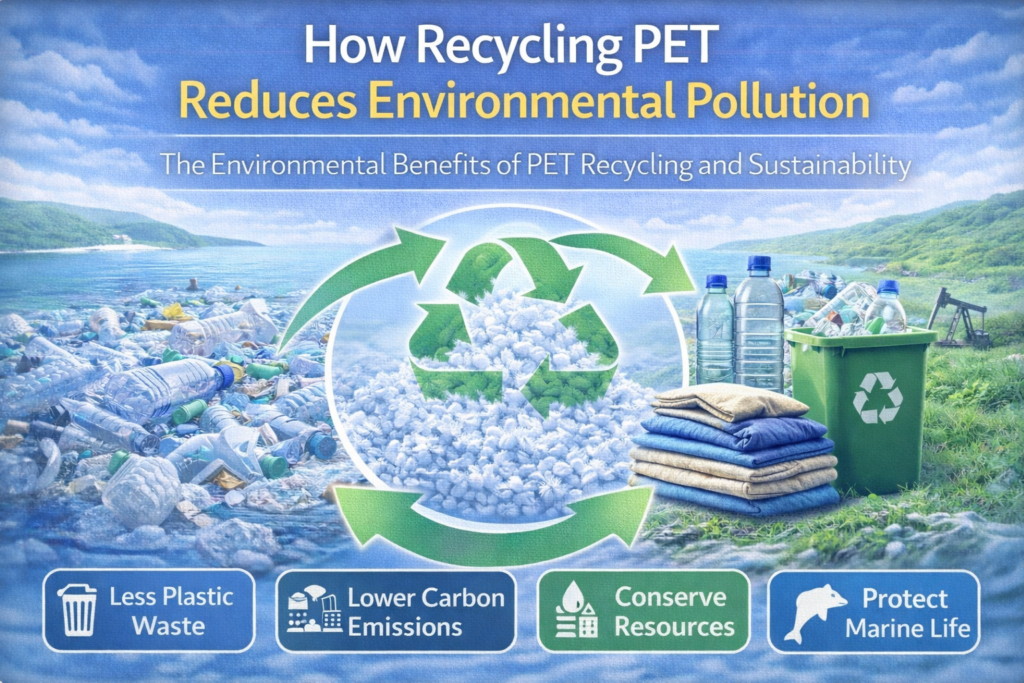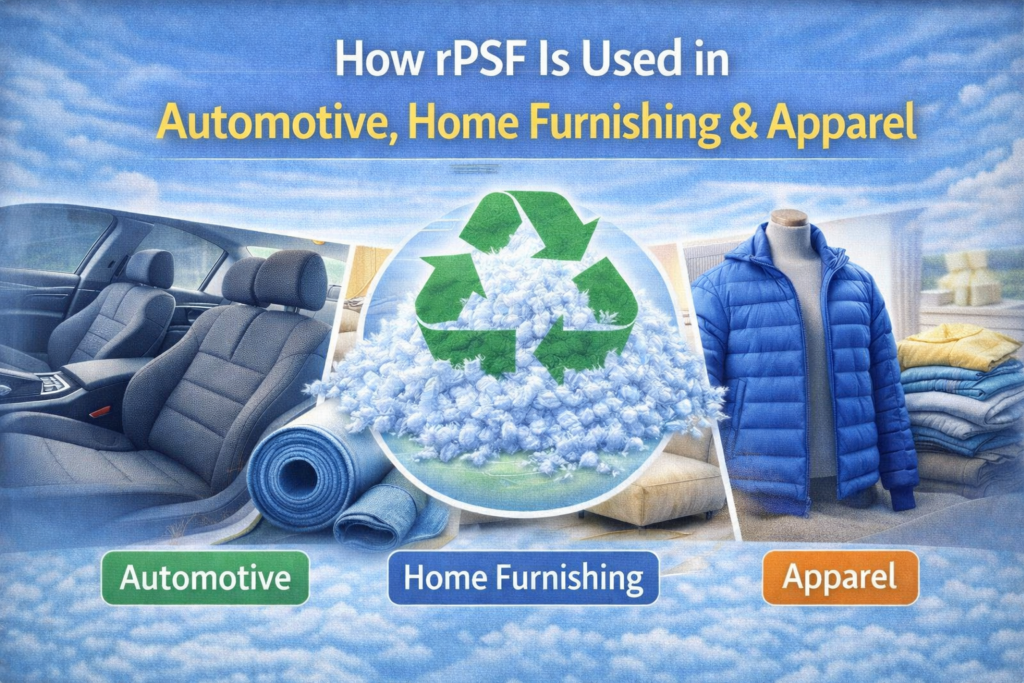India’s textile sector is among the world’s largest, playing a significant role in the country’s GDP and employment. Today, there is a drastic change happening, and that too because of sustainability, innovation, and green consumerism. Recycled polyester fiber (RPF) serves as a sustainable substitute for virgin polyester and supports the ongoing shifts in sustainable reuse and recollection of virgin polyester waste. This innovation is changing the fabric production in terms of waste management and India’s global competitiveness in the textile field.
Learning About Recycled Polyester Fiber
The Recycled polyester fiber production begins with gathering plastic waste, and converting it into textile fiber. PET bottles are shredded, melted and spun to manufacture the required polyester fiber. The end product is less harmful to the environment while retaining a number of the advantages of virgin polyester.
This method not only prevents plastic pollution but also saves resources and energy. Research indicates that the manufacture of recycled polyester consumes no more than 50% less energy and releases fewer greenhouse gases than virgin polyester production.
Why India’s Textile Industry is Adopting RPF
The use of recycled polyester fiber in India’s textile sector is being driven by a mix of international demand for green products, government policies, and the increased concern for the environment among consumers.
- Global Competition – European and North American markets are increasingly interested in green products. Indian manufacturers are benefiting from these areas by adopting RPF.
- Government Policies – Initiatives like Swachh Bharat Abhiyan and regulating plastic waste are motivating industries to use green raw materials.
- Cost Efficiency – Compared to crude oil’s erratic pricing for virgin polyester, recycled polyester’s raw materials are affordable and long-term reliable.
Applications of Recycled Polyester Fiber
Recycled polyester fiber finds applications in fashion, home textiles, automotive, and industrial uses.
- Fashion & Apparel – Sportswear, jackets, dresses, and T-shirts are being produced using RPF to address the environmentally aware fashion consumer market.
- Home Furnishings – Curtains, upholstery, and carpets are now being manufactured with recycled fibers without sacrificing quality and aesthetics.
- Automotive – RPF is used in the auto industry for seating fabric and interior trim for reasons of durability and eco-friendliness.
This cross-industrial usage is supporting Indian manufacturers in expanding their product lines while converging with green practices.
Economic and Environmental Impact
The expansion of RPF in India is not only good for the environment but also for the economy. Plastic waste collection and processing have created new jobs, particularly in recycling and waste management factories.
On the environmental front, every tonne of recycled polyester fiber manufactured recycles about 60,000 PET bottles that do not end up in landfills. This saves natural resources, reduces microplastic pollution, and decreases carbon emissions — all in India’s support of climate change objectives under the Paris Agreement.
Challenges Scaling RPF Production
Scaling recycled polyester production in India is no easy task, despite its advantages:
- Infrastructure Gaps – Effective segregation and collection of waste systems are yet to be developed.
- Quality Control – Maintaining consistent fiber quality from diverse plastic waste sources is a challenge.
- Awareness – Although demand is increasing globally, domestic consumer awareness of RPF products is low.
These challenges need to be overcome through cooperation between manufacturers, policymakers, and consumers.
Also Read: 2025 Plastic Packaging Recycling Rules in India: A Manufacturer’s Compliance Guide
The Road Ahead
With sustainability increasingly becoming a non-negotiable in international textile trade, India’s early leader status in using recycled polyester fiber is setting it up for long-term prosperity. Venture capital, collaborations with international brands, and outreach efforts to publicize its use can catalyze the transition.
Through the use of recycled polyester fiber, India’s textile sector is not only innovating — it’s sewing a greener, cleaner, and more competitive future.







